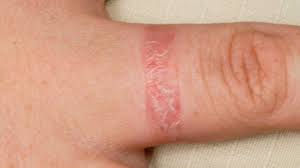Eczema, also called "dermatitis", is not a specific diagnosis, but is a category of many diagnoses. All of these conditions have similar pathology in that there is inflammation of the superficial skin layers resulting in redness, flaking, and itching. The cause of this inflammation differs and the treatments, while similar, have some important differences which a certified dermatologist will be able to identify.
But treating eczema can be expensive, costing you thousands of dollars. What should you do if you can’t afford expensive treatment? The answer is our Psoriasis And Eczema Treatment Center. At our center, we treat you by performing different procedures that suit your skin best - and all of them will fall well within your budget!

Conditions where dry skin care can be very helpful:
Atopic dermatitis is the a condition in which the skin is hypersensitive and easily irritated. This typically affects the front of the elbow and behind the knee, but any area may be affected.
Nummular Dermatitis is a result of excessively dry skin. Patients complain of rough dry spots on the legs that are about the size of a quarter or silver dollar.
Irritant Contact Dermatitis results after something, either a product, chemical, or mechanical friction, irritates the skin. It is often best to remove whatever is the causing agent (i.e. rubbing, detergents, cleansers, wool clothing, etc).
Other Causes:
Seborrheic Dermatitis, also called Seborrhea or "Dandruff", is believed to be caused by yeast that feeds of the oils in the skin resulting in flaking and/or redness. This is commonly mistaken for psoriasis of the scalp. Commonly affected areas include the scalp, smile lines, creases of the nose, armpits, and chest. Click here for more information about Seborrheic Dermatitis.
Allergic Contact Dermatitis is caused by an allergy to a topically applied product. Poison ivy, mango skin, and other plants are common causes. There are many other causes of allergies including make-ups, shampoos, hair dye, moisturizers, perfumes, cleansers, glues, dyes, rubber additives, and sunscreens, just to name a few. Specialized allergy testing, called "Patch Testing", can be performed to test for these types of allergies. The patch testing is done in our Psoriasis And Eczema Treatment Center. This differs from "scratch tests", blood tests, or intradermal testing for other types of allergies (i.e. foods, etc.). This type of allergy testing is expensive (over $1500) but you don’t need to spend extra dollars because our patch testing will help your skin the same way these expensive tests do.
With patch testing the chemicals are applied to the skin on little disks. These disks are taped on and remain on the skin for 48 hours. Once removed, we look for a reaction. Two days later the patient returns for a final look to see if a reaction occurred. This type of testing is not expensive and is performed in our office at the Psoriasis And Eczema Treatment Center.
Come visit us at our office or you can book a consultation online. Our specialized dermatologist will make sure to guide you properly according to your eczema type.
